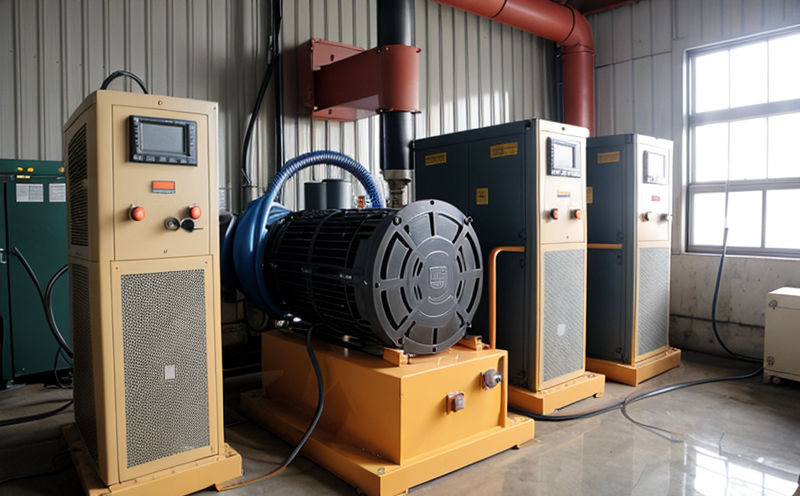ASME PTC 18 Hydraulic Turbine and Pump Performance Testing
The ASME (American Society of Mechanical Engineers) PTC 18 standard is a cornerstone for ensuring the safety, performance, and reliability of hydraulic turbines and pumps. This comprehensive service involves detailed testing to verify that these critical power generation components meet stringent requirements set forth by industry standards.
Hydraulic turbine-pumps are used in various sectors including hydroelectric power plants, nuclear facilities, large industrial complexes, and water treatment plants. These systems must operate under extreme conditions with minimal failure rates, making compliance with ASME PTC 18 essential for ensuring long-term performance and safety. The testing process involves a series of rigorous checks that cover critical areas such as flow measurement accuracy, power output efficiency, cavitation resistance, and durability.
Flow measurement is paramount in turbine-pump assessment. Instruments like rotameters or differential pressure transducers are used to measure the flow rate accurately during both steady-state and transient conditions. Power output testing ensures that the turbine can generate expected levels of electrical energy, which is crucial for maintaining grid stability. Cavitation tests help assess how well the pump can handle high-pressure conditions without causing cavitation bubbles that could lead to erosion or failure.
Durability testing simulates real-world operational scenarios over extended periods to evaluate wear and tear on critical components. This includes examining materials used in construction for their resistance against corrosion, stress, and fatigue. Compliance with ASME PTC 18 means adhering strictly to these procedures while documenting every step of the process meticulously.
Once all tests have been completed successfully, detailed reports are generated which summarize findings from each section analyzed under ASME PTC 18 requirements. These documents serve as valuable resources for stakeholders involved in operations management and maintenance planning.
In summary, ASME PTC 18 testing provides a robust framework for assessing the performance characteristics of hydraulic turbines and pumps across diverse applications within power generation facilities. By adhering to this standard, organizations can enhance operational efficiency while minimizing risks associated with equipment failure or non-compliance penalties.
Industry Applications
- Hydroelectric Power Plants: Ensuring optimal performance of turbines used in harnessing water power to generate electricity.
- Nuclear Facilities: Verifying the reliability and safety of pumps critical for coolant systems and other essential processes.
- Large Industrial Complexes: Testing pumps involved in process fluids handling, ensuring consistent supply and quality.
- Water Treatment Plants: Assessing the efficiency of pumps used for treating wastewater or potable water supplies.
The versatility of ASME PTC 18 testing makes it applicable across numerous industries where reliable hydraulic machinery is indispensable.
Quality and Reliability Assurance
Compliance with ASME PTC 18 standards ensures that manufacturers, installers, and operators of hydraulic turbines and pumps adhere to the highest quality and reliability benchmarks available. This standard guarantees consistency in product performance across different environments and usage scenarios.
The testing process encompasses several key aspects:
- Flow Measurement Accuracy: Ensuring precise measurements under varying conditions using advanced instrumentation techniques.
- Power Output Efficiency: Confirming that the turbine generates expected electrical power outputs efficiently without significant losses.
- Cavitation Resistance: Evaluating the pump's ability to withstand high-pressure environments without causing internal damage due to cavitation bubbles.
- Durability Testing: Simulating long-term operational conditions to assess material integrity and lifespan.
Through adherence to these stringent criteria, operators can ensure that their equipment operates smoothly and reliably under all expected operating conditions. This not only enhances safety but also contributes positively towards meeting regulatory requirements imposed by relevant authorities worldwide.
Competitive Advantage and Market Impact
Implementing ASME PTC 18 testing offers significant competitive advantages to organizations in the power generation sector. Not only does it provide a strong foundation for maintaining compliance with international standards, but it also enhances brand reputation through consistent quality assurance practices.
- Enhanced Reputation: By meeting strict ASME PTC 18 criteria, companies demonstrate their commitment to excellence in product development and manufacturing processes.
- Increased Customer Trust: Reliable performance guarantees higher customer satisfaction rates leading to sustained business relationships.
- Premature Failure Reduction: Thorough testing helps identify potential issues early on preventing costly repairs or replacements later down the line.
- Regulatory Compliance: Meeting ASME PTC 18 ensures that all aspects of turbine and pump design, installation, and maintenance align with applicable regulations worldwide.
In addition to these direct benefits, organizations adopting this standard also contribute positively towards fostering a safer and more sustainable environment by promoting best practices in power generation technology.





